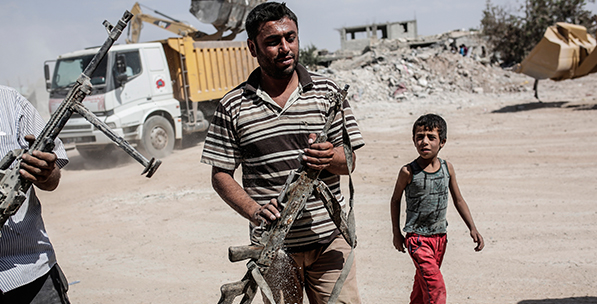The cowardly terrorist attack perpetrated by two suicide bombers at a peace rally in the heart of the capital Ankara that cost the lives of 102 people last Saturday sent shockwaves across Turkey. Preliminary findings of the investigation into the deadliest terror attack in the history of the Republic indicate that terrorist cells affiliated with the Islamic State of Iraq and al-Sham (ISIS) that move between Turkey and Syria are the obvious suspects. Since the government took the brave decision on July 23 to start coordinated security operations against ISIS, the PKK and the Revolutionary People's Liberation Party-Front (DHKP-C), allowed the use of the İncirlik and Diyarbakır air bases by the U.S. in the war against ISIS, implemented effective border controls to hinder the passage of foreign fighters, ammunition and smugglers, and intensified raids against ISIS operatives in Turkey, this judgment is well founded.
However, one needs to remember that taking advantage of the power vacuum in Syria and the relationship of its sister organization the Democratic Union Party (PYD) with the U.S., the PKK broke the peace process and unleashed terrorist attacks that cost the lives of 150 security personnel in the last three months. Therefore, scenarios indicating the possible involvement of the PKK in the deadly attacks also deserve due attention, especially in view of the well-choreographed response given by PKK supporters and its political arm, the Peoples' Democratic Party (HDP), on social media.
Selahattin Demirtaş, the co-chairman of the HDP, used particularly provocative language calling the Turkish state a "murderer" and deliberately exaggerating the numbers of the deceased. Since the attack was perpetrated against a massive crowd gathered by left-wing NGO's, labor unions as well as supporters of the Republican People's Party (CHP) and the HDP, Demirtaş had the credit to be emotionally sensitive; but the use of such irresponsible language by the chairman of a constitutional political party represented in Parliament by 60 deputies was totally irresponsible and unacceptable.
Politically, the HDP took the opportunity to further galvanize polarization in Turkish society and vilify the Justice and Development Party (AK Party) and President Recep Tayyip Erdoğan and make them directly responsible for the deaths. This is not surprising given the failure of the HDP to stand against the PKK when the resolution process was sent down the drain and assassinations against security forces started at full-speed after the June 7 elections. Clearly, the PKK wanted to create havoc in eastern Turkey and force the way of the HDP into a stronger parliamentary group by terrorizing complete cities. Using the pro-HDP bias in mainstream Turkish media and the failure of the Turkish left to distance themselves from the violence, the articulation of the rhetoric of "victims of terrorism" also became possible. We should condemn the cowardly bomb attacks in Ankara without any ifs and buts, yet be also vigilant against the use of such dramatic incidents to cover the barbarism of the PKK toward security forces and implied support of the HDP.
The complex international conjuncture in Syria, in which Russia, the U.S., Iran and Assad's forces form conjunctural alliances and perform proxy wars through the PYD, Hezbollah, ISIS, and moderate opposition grounds created a fertile ground in which multiple terrorist organizations could flourish simultaneously. Particularly, ISIS and the PYD emerged as instrumental tools for big power meddling by trying to avoid direct confrontation with Assad's forces and concluding implicit deals for taking control of critical regions (PYD), or maintaining a lucrative oil trade (ISIS). Therefore, Turkey's decision to interfere in the Syrian War more actively as part of the international coalition, and the unease this created in certain regional rivals such as Iran, had direct implications in terms of the trajectory of the ongoing struggle against both terrorist organizations.
Over the course of the last few months, Turkey has become the stage for multiple intelligence and terror organizations, perhaps more intensively than at any other time in history. It was no coincidence that domestic-international security challenges escalated rapidly following the June 7 elections and the governance vacuum created by the failure of the AK Party to form a single-party government.
Despite all this mayhem, the political and economic foundations of New Turkey are not crumbling; in fact they have proved resilient and continue to withstand multiple challenges. The social fabric proved resistant against divisive political rhetoric and provocative calls for mass revolts against the public order. A clear electoral vote of confidence in the Nov. 1 elections could easily turn the tide toward political stability and societal optimism.
[Daily Sabah, October 17, 2015]






